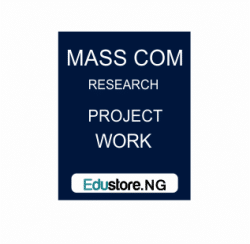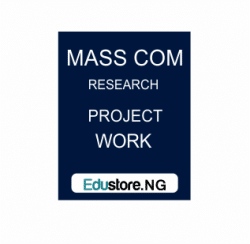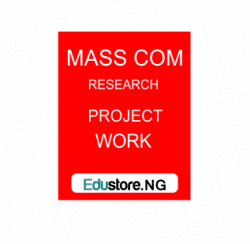The influence of social media in the reading and writing abilities of undergraduates (case study of the university of Benin)
Abstract
This study was on the influence of social media in the reading and writing abilities of undergraduates (case study of the university of Benin). The total population for the study is 200 undergraduates of university of Benin. The researcher used questionnaires as the instrument for the data collection. Descriptive Survey research design was adopted for this study. A total of 133 respondents made final year students, year four students, year three students and year two students were used for the study. The data collected were presented in tables and analyzed using simple percentages and frequencies.
Chapter one
Introduction
1.1Background of the study
Social media is a multi-purpose platform with web-based technology which incorporates text, sound, video, and images with the purpose of making communication more interactive, appreciative and enjoyable (Kaplan and Haenlein, 2010). It is a means of interaction among people in which they create, share, exchange and comment on contents among themselves in virtual communities and networks (Ahlqvist et al., 2008). It introduces substantial and pervasive changes to communication between organizations, communities and individuals (Kietzmann et al., 2011). Social media technologies take on many different forms including magazines, Internet forums, weblogs, social blogs, microblogging, wikis, social networks, podcasts, photographs or pictures, video, rating and social bookmarking. The text components of social media spell out vividly using alphabets to send information across through reading. The images and video components complement the text with more pictorial understanding of the intended information being sent across while the sound components appeal mainly to the ear to send the intended message information across to targeted readers. Social media networking on the internet is a type of online application that has recently developed. It is common and appreciated by a lot of people.(Pempek et al., 2009)
Reading and communication require dissemination of whatever is read precisely and concisely into the brain. When reading is done with only the text components of communication, much of the information required to be sent to/by the brain get lost on the way (Stevenson, 2004; Parkinson, 2012). This is attributed to the fact that all the senses involved in the pictorial imaginations and understanding as well as the ear connections and contributions are not used leaving only the text which the mind can convert into meaningful information for usage. Pictures interacting with text, gives a better understanding of the subject matter than text only. This also enhances memory (Levin, 1989).
Academic reading is the kind of reading done when learning or studying in an educational institution. It is active reading with clear thinking whilst reading (Pritchard, 2008). Reading an academic text differs in many ways from reading comics, novels and magazines. Academic texts deal with concepts and ideas related to subjects that are studied at college or university. The idea is that one should challenge what they read as well as keep record of what is read. Simply put, one needs to be ‘critical’. A critical reader will question issues and opinions in text presented by authors. By critically engaging with the text, the reader will realize which part of the message is useful and can be used to support or oppose their ideas in a convincing and powerful fashion, rather than merely reading and not reflecting upon the text. In academia, reading is strongly connected to writing. Thus what is written will always have a link with what is read (Lines et al., 2012; Gillett, 2013)
As pointed out by Loving and Ochoa (2010), social media has proven to be generally addictive for undergraduates who are inclined to devote substantial amounts of their limited study time to chat, maintain social connections and make new acquaintances during their years of study. These, in effect according to Ofuani and Gberedio (2009), decrease the number of time students need to read their books and other study materials. The fundamental reason for conducting this study is the fact that as an educator seeing students’ reluctance in reading books and now writing in short form and other study materials widely due to this social media menace is a disturbing phenomenon. The problem most undergraduates have that contributes to their poor performance academically is the use of social media that affects their reading and writing. Currently, as mentioned earlier, due to the influence of social media, undergraduates read much less their books. Even examination malpractices may be traceable to the use of social media undergraduates’ reading and writing presently is stifled by the persistent use of social media. Consequently, they have become passive readers who will rather browse. They would rather spend many hours chatting with friends instead of reading. Some even use the social media in the lecture halls instead of paying attention to what is being taught; they do so because they rely on its information accessibility to provide direct lifting of answers
Statement of the study
The problem that necessitated the research is the rate at which undergraduates’ trade-off academic learning for social media content generating sites such as face book, 2go among others. The use of social media has become so rampant nowadays that leaves so many questions to be desired. The situation is not just disturbing to every stakeholder of education but quite alarming. This calls for the need to address social media challenges to students’ cognitive, affective and psychomotor domains. If nothing practical is done to stem the tide at the present, a lasting damage will be done. This will not be good for our country’s education system as the right manpower that will proffer solution to the challenges of our socio-economic development will be far from been achieved.
Presently, it appears that majority of students that come to school with internet connected pay more attention to social media interactions than they do for their academic learning. The time for reading, writing and studying may seem to be devoted to social media interactions that may not have any bearing on their cognitive, affective and psychomotor development. The effect this may have on students’ capability to learn may be devastating. This has tendency to increase poor students’ outcomes among students in schools. This is not good four our country education that is searching a way to redeem itself from its present murky waters.
With the current rate of social media usage among undergraduates, one may predict that at a short time, the neglect of textbooks and learned journals is not addressed, more of our library textbooks and journals will be totally forgotten. This is another challenge to the academic survival of our nation.
More so, the popularity of social media and the speed at which information is published seems to create a lax attitude towards proper spelling and grammar. This may be exported to conventional writing that may reduce students’ ability to effectively write without relying on a computer’s spell check feature. Worse still, many undergraduate cannot read and write students which has been on the increase every year may be connected to students reading and studying time spent on social media interactions undergraduates
Objective of the study
The objectives of the study are;
- To examine the influence of social media usage on undergraduates’ attitude to learning in university of Benin
- To ascertain whether student spend time on social media than reading in university of Benin
- To ascertain whether spending time on social media by undergraduate affect their writing ability in university of Benin
- To ascertain the advantages and disadvantages of social media on students’ academic performance
1.4 RESEARCH HYPOTHESES
For the successful completion of the study, the following research hypotheses were formulated by the researcher;
H0: There is no significant influence of social media usage on undergraduates’ attitude to learning in university of Benin
H1: There is significant influence of social media usage on undergraduates’ attitude to learning in university of Benin
H02: spending time on social media by undergraduate do not affect their writing ability in university of Benin.
H2: spending time on social media by undergraduate affect their writing ability in university of Benin
Significance of the study
The study will be significant to students, teachers, parents, educational psychologist’s and policy makers on the current trends in social media world, in the following ways: The study will help the students to know that social media can help them improve their learning ability and school work performance if used judiciously. The study will help the teachers to gain additional knowledge on the current issues in social media usage by the students and find the appropriate measures in helping students to maximize gain on these media for academic attainment. It will also open the eyes of the parents to the challenges encountered by their students in social media usage in relation to their physical and cognitive development and the levels of their performance in education. This study will be useful to the guidance and counselors on how to make adolescent cope with the challenges of social media and social networking that suit education of these adolescent students for educational purpose and control the access to bad social media sites that affect students’ educational attainment
Scope and limitation of the study
The scope of the study covers the influence of social media in the reading and writing abilities of undergraduates (case study of the university of Benin). The researcher encounters some constrain which limited the scope of the study;
- a) AVAILABILITY OF RESEARCH MATERIAL: The research material available to the researcher is insufficient, thereby limiting the study
- b) TIME: The time frame allocated to the study does not enhance wider coverage as the researcher has to combine other academic activities and examinations with the study.
- c) Organizational privacy: Limited Access to the selected auditing firm makes it difficult to get all the necessary and required information concerning the activities.
1.7 DEFINITION OF TERMS
The following terms are operationally defined in the research study
- Social Media: These are forms of electronic communication which facilitate interactive base on certain interests. Social media include web and mobile technology. It is a group of internet based application that allows the creation and exchange of user generated content. In this study, emphasis is on facebook, whatsapp and 2go commonly used by adolescents.
- Learning Ability: The learning ability of any individual referred in the study is mental ability of individuals to cope with things around him. This is often associated with the quality of potential an individual has inherited from his or her parents.
- Learning:The activity or process of gaining knowledge or skill by studying, practicing, being taught or experiencing something.
- Attitude: This isindividual behavior or reaction to certain action or stimuli which may be positive or negative.
- Writing Skill: This refers student ability to compose meaningful text of sentence length or longer, communicating ideas, messages and information this is a medium of human Writing is communication that represents language and emotion through the inscription or recording of signs and symbols
- Academic Performance: this refers to the ability of student to do well, fairly or poorly in an examination.
- For Reference Only: Materials are for research, citation, and idea generation purposes and not for submission as your original final year project work.
- Avoid Plagiarism: Do not copy or submit this content as your own project. Doing so may result in academic consequences.
- Use as a Framework: This complete project research material should guide the development of your own final year project work.
- Academic Access: This platform is designed to reduce the stress of visiting school libraries by providing easy access to research materials.
- Institutional Support: Tertiary institutions encourage the review of previous academic works such as journals and theses.
- Open Education: The site is maintained through paid subscriptions to continue offering open access educational resources.






